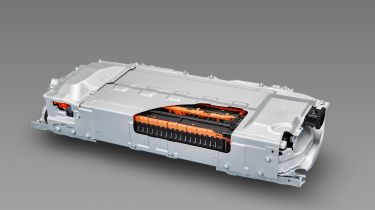Electric car battery recycling: all you need to know
How recyclable are the batteries from electric cars? The situation isn't perfect, but a number of solutions are being worked on

Electric cars are taking over at some pace, and while it will be a while yet before most people are driving them, they already make up a significant chunk of the new car market. In 2023, there were 1.9 million new cars registered in the UK, with almost 315,000 of those being electric - a 17.9 percent increase from 2022. But what happens to all the batteries at the end of the car's life? Can electric car batteries be recycled?
When dealing with ordinary combustion engined cars, the process of recycling and scrapping cars is simple and established, but the same isn’t currently the case for expired electric car batteries. However, things are developing quickly and there are already solutions for recycling and reusing battery packs.
The approaching ban on the sale of new petrol and diesel cars from 2035 means that used lithium-ion batteries will soon become as common as an old engine or gearbox at the end of its lifecycle. At the moment, it’s a bit easier to get rid of combustion engine components safely and efficiently, but that's only because we have a lot of experience with such things and the infrastructure has been built over many years.
Just like engines, lithium-ion batteries have a lifespan. It can be longer or shorter depending on how they are used and the climate they are used in. So if the electric cars cover heavy mileage and are used in sub-zero climate you would expect the battery to have a shorter life, but in contrast EVs used in hotter climates and driven over very few miles would be expected to have a longer life.
Generally though, they last for between 100,000 and 200,000 miles or 15 to 20 years, according to the National Grid’s website. That can be more than a petrol or diesel engine, but the fact is that nothing lasts forever and once the battery isn’t able to provide a decent level of power any more, it needs to be recycled in some way.
The great news is that it is possible to recycle EV batteries really efficiently with the right tools and knowhow. According to lead engineer of Warwick Manufacturing Group, Anwar Sattar, “technically, over 90% of the cell can be recovered but since recycling involves the reuse of the recovered material, it becomes a commercial activity and companies will only recycle those parts that give them a positive financial return.”
In the EU, they have enforced a Battery Directive that stipulates that at least 50 per-cent of the material from a battery must be recycled and after December 2025 that will increase to 65 per-cent. What this means is, even in cases where there isn’t a big financial incentive, key components such as wires and plastics will be reused where possible.
The hardest part of the battery to recycle are the components that hold the power, according to Sattar. “The electrolyte is flammable, explosive and highly toxic,” he says. “It's very sensitive to water and forms hydrofluoric acid (HF) on contact with water. These hazards must be dealt with in any recycling process before the rest of the cell components can be recycled.”

Recycling the materials in used batteries
EV batteries are required to provide a lot of energy in a relatively small package, which requires a substantial amount of cobalt in lithium-ion batteries. But energy-storage units in buildings don’t need to be so small and lightweight, so it’s commonly argued that it's better to recycle the precious metals of lithium and cobalt for other transport applications.
Cobalt production is a critical issue for battery sustainability and the future of electric mobility. Much of it is mined in the Democratic Republic of Congo, where the process raises serious ecological, ethical and human rights concerns, so reducing dependency on it as demand for batteries rises is one of the greatest challenges.
Dr. Gavin Harper, a Faraday Institution research fellow at the Birmingham Energy Institute’s project on recycling and reuse of lithium-ion batteries (ReLiB), states: “if we face constraints around cobalt, some feel we should focus this precious resource on more demanding applications such as EVs. It may make more economic sense to recycle EV batteries for use in brand-new batteries for cars, rather than using them in a used state in a less demanding application [such as power storage].”
Mercedes-Benz agrees with this. In April 2017 the German manufacturer launched a home energy-storage system that utilised batteries from the range of electric cars that the brand offered, but the product was axed only a year later, with the company claiming that “it’s not necessary to have a car battery at home: they don’t move, they don’t freeze; it’s overdesigned.” So, for Mercedes at least, the costs didn’t add up.
In contrast, Nissan is adamant that EV battery technology is transferable for home-energy use. A spokesperson stated that Nissan “is committed to operating in the energy services market and is strongly placed to use both new and second-life EV batteries for energy storage in a way that's commercially viable.”
Another huge consideration is the recycling process. Belgium-based company Umicore is already offering recycling for lithium-ion batteries. It reclaims the valuable metals using a combination of ‘pyro and hydro-metallurgy’, which are processes using either heat or liquids to recover metals. Umicore has an annual capacity to recycle around 7,000 tonnes of lithium-ion batteries - the equivalent of 35,000 electric car batteries - in the pilot plant in Nersac, France.
According to a company spokesperson, Umicore “can easily scale up its recycling activities when the market grows, which we expect to happen in 2025". What makes it even better is that these metals can be recycled indefinitely, so they can be reclaimed from used batteries and to produce new batteries that are as good as any other for as long as the company wants.
In November 2020, Finnish company Fortum announced the development of "a new and efficient way" to recycle lithium from rechargeable batteries. Before the development, the firm was already achieving a claimed recycling rate of over 80% for lithium-ion battery materials with 95% of the valuable metals inside the battery put back into circulation to make new batteries, thanks to a low-CO2 recycling process to recover cobalt, nickel and manganese.
In January 2022, waste-management firm Veolia announced its first battery recycling plant in the UK, in Minworth in the West Midlands. It aims to have the capacity to process 20% of the country's end-of-life electric-car batteries by 2024. Veolia describes the used battery recycling process as 'urban mining' and says it can reduce water consumption and greenhouse-gas emissions by up to 50% compared to extracting fresh raw materials and building brand-new batteries.
More recently, VW UK announced that in February 2024, they would partner with a company called Ecobat to collect and recycle EV batteries at the new recycling facility in the UK. Within this facility the core elements of the recycled batteries are recovered and then refined, with over 80 per cent of the material returned to battery manufacturing. Many other manufacturers such as Honda and Renault are making similar partnerships with aims to further reduce their carbon footprint.
Finally, Tesla plans to recycle its batteries to the point where it will not need to mine metals for new batteries at all. The company's former CTO, JB Straubel, said that Tesla is “developing more processes on how to improve battery recycling to get more of the active materials back. Ultimately, what we want is a closed loop that reuses the same recycled materials". Straubel has even since moved on to set up his own company to help solve the issue of battery recycling.
Second life: batteries as power storage for homes, industry and energy generation
Other ways to utilise batteries beyond completely recycling them is to use electric-car batteries in their complete state as power storage for homes and industrial buildings. For example, in April 2021 Volvo reaffirmed its commitment to becoming a "circular business" by 2040, creating a "closed loop'' that'll see all the materials in its cars recycled.
Within this, Volvo announced a project to look into the prospect of second-life applications for its high-voltage batteries. One element of this is a collaboration with BatteryLoop that sees batteries from electrified Volvo cars used as a solar energy storage system. This powers charging points for electrified cars and electric bikes at Swedish healthcare company Essity’s premises near Gothenburg.
In another project, Volvo, Cleantech company Comsys and energy firm Fortum are running a pilot that aims to increase supply flexibility at a hydropower facility in Sweden. This would use battery packs from Volvo plug-in hybrids as stationary energy storage units, helping to supply so-called "fast-balancing" services to the power system.
Volvo says these and other projects investigate how batteries age when used in second-life applications that have significantly less aggressive cycling compared to in-car use. This also allows the Swedish firm to learn the commercial value and potential future revenue opportunities.
"We want to find out how long the batteries will last in these applications; that's why we're doing these tests, to really see what are the financial and sustainability benefits." Volvo's head of sustainability Anders Karrberg told DrivingElectric. However, Volvo is yet to be convinced that second-life applications are the most sustainable route to go down with batteries that have come out of hybrid and electric cars.
Karrberg explained: "To make a battery produces about six to eight tonnes of CO2 and also requires a lot of virgin valuable metals. So the battery has a value from a sustainability point of view. But for how long, we really don't know. Extending its lifetime boosts that value, but we want to find out the details of this – and one outcome could actually be that it's better to go for recycling right away, but the jury's still out on that."
In April 2024, Jaguar Land Rover, in collaboration with energy storage start-up Allye Energy, announced that it had developed a portable electric-car charger by repurposing battery packs from Range Rover and Range Rover Sport PHEV batteries. The unit, called the Battery Energy Storage System (BESS), boasts a capacity of 270kWh, has Type 2 connectors and comes with built-in solar panels for clean recharging in sunny skies. JLR states that the BESS will power over 1,000 hours of EV driving a year, which will save over 15,494kg of CO2 during that period.
Nissan already uses second-life batteries from the Leaf for static energy storage in industrial and domestic installations, offering an off-the-shelf home or commercial energy storage unit, called xStorage. A rival to the Tesla Powerwall, Nissan’s is different because you can choose from new and secondhand batteries. A spokesperson for the Japanese carmaker has stated that Nissan “is committed to operating in the energy services market and is strongly placed to use both new and second-life EV batteries for energy storage in a way that's commercially viable.”
New and improved battery technology
An alternative battery technology for the future is sodium-ion batteries. These function in pretty much the same way as a lithium-ion battery unit and are just as recyclable. Sodium is also cheaper and far more abundant than lithium, so if sodium-ion batteries can perform to the same level as lithium-ion batteries, it could be a no-brainer.
Solid-state batteries are another future battery technology, as these are much less flammable and could potentially be even more efficient than current lithium-ion cells. Nissan, the Stellantis Group, Toyota, Mercedes, Ford, Volkswagen and Hyundai are all pursuing this route. However, are solid-state batteries recyclable?
According to Peter Slater, professor of materials chemistry and co-director of the Birmingham Centre for Energy Storage, the recyclability of solid-state batteries "would present different challenges in terms of separating the components. In particular, it's likely that it would need chemical separation routes, such as those being developed through the Faraday Institution’s ‘ReLib’ project."
Nissan has announced that the company intends to become the market leader in solid-state batteries. The Japanese manufacturer expects development cars to hit the streets in 2026 with a production ready example anticipated to arrive in 2028.
Speaking to Auto Express, Matthew Wright, Nissan Europe’s vice president of powertrain engineering said: “They're going to be a game changer. Charging speed is better, energy density is better, which means you get a smaller battery with the same energy. It addresses one of the problems you've got with EVS, at the moment - the fact batteries make your car heavy.”
Volvo's head of traction battery development Ulrik Persson believes that viable solid-state batteries could potentially arrive on the market between 2025 and 2030 – although they would initially only exist in premium electric cars. "It will make batteries both safer and potentially more potent at the same time. The solvents for the electrolytes in batteries are hazardous materials, so if we can get away from using those, that would make the manufacturing process easier."
Ultimately, if the appalling environmental ramifications of putting batteries into landfill aren’t persuasive enough, the reality is that the metals they contain – regardless of the technology involved – are too valuable to waste. In the end, there'll be many and varied answers to the question of “what do we do with used electric vehicle batteries?” The good news is that ecological and economic reasons are unanimous on one thing: don't put them in the ground.
